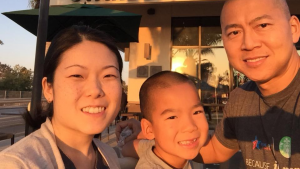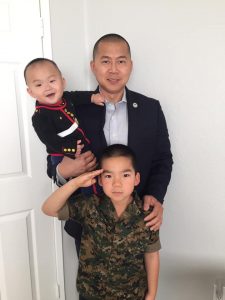Published: July 9, 2021

Black Lives Matter is opening the eyes of Americans across the nation to issues of systemic racism that have long corroded our republic and its values. Our military community is certainly familiar with these issues. Communities of color—especially African Americans—are chronically under-represented throughout the veteran and military family support space. In fact, according to Blue Star Families’ annual Military Family Lifestyle Survey, racial inequality is continually reported as a major stressor for military families of color.
The reality is that these racial inequalities aren’t talked about within the military space. There’s a silence amongst military families of color about their experiences, putting massive stress on the entire family unit. And when there’s stress on a service member’s family, their readiness and the military as a whole is jeopardized.
Take, for instance, Hisako. She’s a second-generation Asian American married to a first-generation Asian American and Marine. After graduating with her master’s degree, Hisako was unable to work for the first few years due to limited job availability where her family was stationed. When they moved to their next duty station, Hisako was hit with another challenge. She found herself in the National Capital Region, where employment is extremely competitive, with the disadvantage of not having connections and ties to the area to help get her foot in the door. As a highly educated and qualified professional, Hisako was disappointed to find herself amongst the 22 percent of unemployed military spouses, thus carrying the burden of financial distress that was placed on her family.
As someone who supports the military, you may be shocked to know this:
Military families of color are more likely to experience financial distress and are less likely to hear about support and resources. Most importantly, the leadership teams and organizations who serve them—Military Service Organizations and Vetran Service Organizations—are disproportionately white.
 Such inequalities have created a culture where military families of color don’t feel like they belong. As we well know, a lack of belonging can further wreak havoc on our All-Volunteer Force’s readiness and resilience.
Such inequalities have created a culture where military families of color don’t feel like they belong. As we well know, a lack of belonging can further wreak havoc on our All-Volunteer Force’s readiness and resilience.
In Hisako’s case, she was determined to find a job, against all odds, because the loss of income and identity was soul-crushing and hindering her ability to be a good wife and mom. When she landed a Blue Star Families fellowship, other opportunities followed. The fellowship turned into a consulting position with Blue Star Families, which eventually led her to become the director of her department. But something still weighs heavily on Hisako. Having worked in the military family space for seven years now, she remains surprised by the lack of representation in her field.
“As an Asian American, I do notice there is not much representation among the VSO/MSOs I’ve worked for or with, which has felt lonely at times,” Hisako said. “I also still hear statements from other spouses that employers don’t want to employ them because they are military-connected and will move. I also hear statements from frustrated spouses about how civilians believe spouses don’t need to work. It’s 2021, and it’s disheartening to hear these statements.”
If a spouse isn’t thriving, our nation’s service members aren’t either because these issues weigh heavily on their conscience. Therefore, the whole force is affected. How do we know? People like Lieutenant General Gwen Bingham, U.S. Army (Ret.), tell us time and time again. “I couldn’t be the ready soldier I was unless I knew my family was taken care of,” said Lieutenant General Bingham.

That’s why our heroes and their families are turning to Blue Star Families to be a liaison, advocate, and catalyst for change on racial inequality within the military and veteran space
“We’re doing this by establishing DEPLOY Military Community Fellows, a Blue Star Program designed to diversify and expand the pipeline of leaders in the military community,” said Kathy
Roth-Douquet, founder and CEO of Blue Star Families. “The effort will embed, and train individuals from historically under-represented populations into the Blue Star Families organization as paid staff in national and Chapter roles. Through our training, we’ll seed a new generation of leaders throughout the veteran and military family support space.”
The fellowship will aim to solve three specific problems:
- Help communities of color better recognize themselves among the military-affiliated organizations intending to represent them.
- Train a diverse cohort of military spouses and veterans for professional roles like marketing/communications, technology, operations, research, resource development, and more.
- Enhance the diversity of the Blue Star Families team, so we’re better equipped to build strong communities of support, fostering a greater sense of belonging.
For Hisako, her fellowship was the launching point for her career and meant she could help address the needs of military families like hers. At the same time, she could healthily immerse herself in meaningful work, just like her husband does while serving our country. But too many military spouses aren’t getting connected to the resources available in their community to help them find an intentional, tailored opportunity like Hisako did because of a lack of representation.
It’s no wonder why our military families of color continue to feel isolated or alone, despite our world being more connected now than ever. For that reason, we’re working hard to provide them with new opportunities to connect with others, grow relationships, and strengthen their system of support.
The Racial Equity and Inclusion Initiative and DEPLOY Fellows Program were created after hearing from and listening to military families like Hisako’s. And we don’t want to stop there. Take the survey to share your diverse experience as a military family of color. Tell us what challenges your family continues to face and opportunities you are looking for to enrich life as a military family. Together we can impact change.
Posted In:
